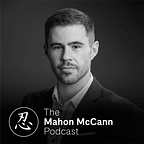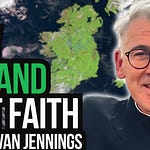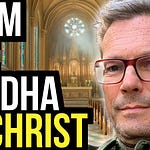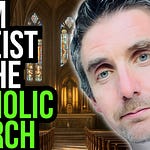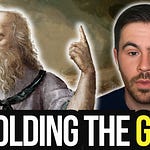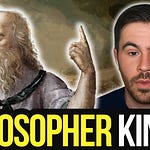In the last essay, we looked at John Verveake’s work on the Meaning Crisis and Jordan Peterson’s Meta-mythology. Mainly we focused on how the crisis is caused (and perpetuated) by the loss of three orders; Narrative, Normative & Nomological. We saw what was lost in the religious worldview and the failure of the scientific endeavour to offer any alternative, and we explored Brett Anderson’s essay ‘Intimations of a New Worldview’ offering a narrative and phenomenological view of John Verveake’s Relevance Realisation, and how this is psychologically and biologically optimal for human beings hence providing a teleology. The teleology, or end, was participation in the process of relevance realisation and creative adaption, which was captured and communicated narratively by the hero meta-mythology detailed by Jordan Peterson in Maps of Meaning.
In this essay, I will be arguing that we see this teleology in Plato’s philosophy and the life of Socrates and that Plato’s philosophy develops even further the process and acts as an ontological grounding for a philosophy of self-development and self-transcendance, establishing some key ideas going forward and a dramatic map we can follow through his myth of the Cave. This return to ancient philosophy will also further our discussion on the import of virtue ethics and the centrality of attention in the project of progressing to the next attainable, aspirational, self.
Socrates & A Philosophical Revolution.
Socrates (born 470 BC) is largely thought to be the founder of Western Philosophy. So much so that every philosopher before him is considered a pre-socratic. In episode 4 of Awakening From The Meaning Crisis John Verveake shows how the time Socrates was born into was not so different from our own (These next chapters will heavily lean on John’s work, so I recommend checking them out at the source also).
The main philosophical schools at the time were the ‘Natural Philosophers’ and ‘The Sophists’. The Natural Philosophers were proto-scientists and their main interest was what the world was made of, in other words, they were concerned with ‘facts’ and not transformations. As John Points out ‘they didn’t indicate how to become wise, overcome self-deception or become a good person’. The Sophists in contrast were professional rhetoricians, specialists in crafting persuasive arguments to sway individuals and audiences to their wills. John argues that the Sophists used ‘bullshit’ to make things salient or relevant (that should not be salient or relevant) to influence people’s behaviour. They had no ethics and didn’t really care about reality, they just used truth to persuade and manipulate people.
Socrates was a radical departure from both these kinds of Philosophy. Socrates split from the Natural Philosophers because he wanted wisdom and not just facts. He split from The Sophists because he didn’t want to bullshit people. Socrates wanted the truth and he was humble and aware of his own ignorance. In other words, he knew what was important, he ‘knew himself’, and paid attention to ‘self-correction’ so he could transform himself to care well and overcome self-deception (Veraveke, Ep 4).
Socrates used this ability to help people give birth to their ‘better selves’ and because of this calling, he thought of himself as an intellectual midwife. Socrates like the hero, occupied the border between order and chaos and constantly questioned and pushed the boundaries of his thinking and others in the search for truth. This is why the Oracle of Delphi said he is the ‘wisest of all men’, because he was aware of his own ignorance, the perennial human capacity for self-deception and self-destruction, in other words, he knew that he knows nothing. As John says,
“Wisdom in this case is about getting our truth machinery and relevance machinery together so we don’t bullshit ourselves.”
Socrates took this practise so seriously, of self-correction and transformation to connect to reality, that he was willing to die for it! His philosophical martyrdom immortalised in the words at his trial: the unexamined life is not worth living.
Plato & The First Psychological Theory.
Plato (Born 428 or 424 BC) was a student of Socrates and a devout follower. Socrates also inspired many other philosophical schools like Stoicism and Epicureanism, but Plato really took on board Socrates' mission. John describes the Socratic mission in EP 5 as “what we find salient or relevant is closely coupled to what we think is real or true, and hence what is transformative about us and what is true of the world, should be held together”.
Sebastian Watzl made a similar point in our recent podcast, that our reality is in large part determined by our patterns of attention and our patterns of attention are who we are! In Watzl’s philosophy, attention is what organises the mind, and prioritisies certain stimuli over others, and so agency begins in the small decisions of attending to one thing over another. What we prioritise (or don’t) says a lot about our character and so changing our character is a matter of changing our prioritisation, in other words, our values. Socrates embodies this process for Plato as he prioritises paying attention to his errors and transforming himself through self-correction into a greater connection with reality, the truth. Socrates is a marvellous example of that philosophical way of being.
Plato in his philosophy invented the first theory of the human psyche ever! In his psychological theory, he split the human psyche into three parts: a man, a monster and a lion. (This is similar to Freud's tri-partite theory of the Ego, ID and Super-ego if you know about that.) For Plato, the monster, or appetite, makes things salient to us, food, sex, video games, and the man reflects on these desires and resists or does not. The third part is a lion, which is motivated by honour and social gain, like the Persona in Jungian Psychoanalysis (Vervaeke, Ep 5).
John tells us that for Plato the reason we do stupid things is because of ‘inner conflict’ - conflict between these competing drives. For example, the man is always behind the monster and so playing catch up to his appetites (as many of us know). John argues Plato’s Philosophy is about the work of ending your inner conflict and getting regulation between the inner selves, and that this is a pre-condition for getting into touch with reality; the inner conflict is an obstacle to the truth. This inner conflict is made up of self-deception and egocentrism - what John describes as the ‘my-side bias’ - and so the process of overcoming the inner conflict involves getting outside one's ‘self’. In radical contrast to the scientific worldview and method, Plato suggests a personal transformation is necessary to see certain truths, and even more shockingly Plato suggests the motivating force for this transformation is and must necessarily be love. This comes together for us when we remember Iris Murdoch's definition of love as ‘the extremely difficult realisation that something other than oneself is real” (Vervaeke, EP 5).
Overcoming Our Inner Conflict.
For Plato, the process of organising the psyche occurs dramatically. The core of the idea is that the abstract man can represent future symbolic patterns to change behaviour now and hence reason and philosophy can tame the monster and the lion because we can learn (Verveake, EP 5). For Plato, this process is self-reinforcing, as John describes:
“I gain more self-knowledge, I become less self-deceptive, and this lets me pick up on more patterns, which in turn I can use to tame the Lion and Monster more, and this creates inner-harmony, that helps me to see more reality” and hence seeing more reality helps to gain more self-knowledge in a positive feedback loop.
Plato’s theories are in concert with many others in the psychoanalytic tradition like Freud and Jung and more modern integrated family systems theory, or parts theory, that start from the pre-supposition that we are not “Masters in our own house”. (This is a sharp contrast to the scientific worldview that considers the mind a rational monad). The point of these theories is we have numerous subsystems which make us more like an ecosystem than a single atomic self and that to be a comprehensive and coordinated individual is a moral achievement but by no means a given.
The fact that organising the psyche occurs dramatically can be explained by conflicts of values. A story represents dramatically the process by which a conflict of values is resolved, one set of values represented by the protagonist and the other by the antagonist. Values is another word for goals, if you value truth, that creates certain goals for you rather versus if you value control, that will supply other goals, and stories track how values transform with different characters representing different values in the ‘story mind’ as it’s called. The reason Plato writes in dialogues and Myths isn't because he’s old and weird but because his philosophy is centrally about this process of overcoming inner conflict and connecting to reality which he also believes is analogous to the ideal state, because the inner organisation leads to an outer organisation, which is a pretty radical proposal.
Plato’s Cave.
This entire process of overcoming self-deception and egocentrism to come closer to reality is, I would argue, taking place in the hero meta-mythology which abstracted from the lives of great people into and encoded into stories for other intercultural generations to emulate. The stories are a dramatic representation of creative adaption which we explored in the last essay, and involves self-transcendence to overcome illusion and discover what is most real, what is most significant. This entire philosophy of ‘education as transformation’ is captured in Plato’s Myth of The Cave, which John argues is a dramatic map out of the perennial problems. This is how John describes the Myth in the Awakening From The Meaning Crisis series:
“Here is the surface...pathway going down...that leads into this inner cavern...There’s a fire here ...There’s people chained to chairs so all they can do is look at the back of the cave...Then there’s other people walking in front of the fire and it’s casting shadows onto the cave because of the firelight and they’re hearing the echoes... And what Plato says is people take the shadows and the echoes to be the real things because they’re chained. They’re caught up. But what happens is, an individual gets free! And what does that individual do? That individual turns and sees the fire. That allows them to realize that the shadows and the echoes aren’t the real things. They’re shadows and echoes! And what happens is the person’s ability to notice the real patterns - as opposed to the merely correlational patterns - is changed (less self-deceptive)…People start to see... They start to realize: ‘oh these are what real patterns feel like’, as opposed to what I thought was real. You get the taste for reality developing, and that taste means they start to look around and explore! And then they realize there’s a path, there’s light coming through it, and then they start a journey upward. Now notice how this journey works: When they take a step forward, they’re blinded by the light, and they have to wait, they have to wait for their eyes to adjust - The self has to be transformed. And then once the eyes have adjusted they can see how to go and then they take another step and then they’re blinded again and there’s this slow process and Plato kept talking about. At various stages they have to stop because they’re blinded and then they adjust and then they gain the ability to see where they couldn’t see before. It’s this participatory transformation I talked about, and eventually they come up here and they look around and what are they looking for? They want to see the source of the real light. The light that’s allowing them to pick up on the real patterns: ‘Where is this light that shows the reality of things coming from?’ And not only is it showing the reality of things, this light is the source of the life of things. ‘Whereas this source? Of understanding and light?’ And they look around and of course they glimpse, because they can’t stare at it directly, the Sun, and it’s overwhelming; It’s beyond their comprehension. But they see it and it fills them with a kind of awe. And of course what they do is they go back down into the tunnel rapidly, and they get here, and they try to tell their fellow prisoners what they saw, but of course they’re stumbling around because their eyes don’t work anymore in that darkness. And they’re saying things that make absolutely no sense to these people. And so they ridicule them and if they could, they would kill that individual. And of course, this is an allusion to Socrates. First of all notice that, contrary to what people think, enlightentment is not just an Eastern idea. This (Myth of the Cave) is a myth of enlightenment: of coming into the light. It’s a myth of self-transcendence and self-transformation. It’s a myth of coming - and I mean a myth; in the sense that we’ve been talking about - it’s a parable of coming into greater and greater contact with reality.” (Veraveke, EP 5)
As a story, the journey out of the Cave seems pretty benign, but if we put ourselves in the shoes of the philosopher it would involve the complete destruction of our world, separation from others, loneliness, fear, uncertainty, facing death, awe, transcendence and then a heroic return to try, and probably fail, to communicate that experience to others - philosophy isn’t for the faint of heart and originally represented a heroic and redemptive mode of being, and not just abstract arguments. We also see deep alignments with other archetypal stories here, like the Buddha, reaching enlightenment but not staying in Nirvana, and returning to help others as the Boddhishava, and Jesus facing the cross and death to redeem the world, despite being the son of god.
Escaping From The Cave.
The Cave is the standard lot of evolved animals called human beings. Our perceptual and cognitive machinery, so necessary for keeping us alive so we can reproduce and adapt, also makes us perennially self-deceptive and self-destructive. The solution suggested by Plato and Socrates is to focus on practices of self-correction, paying attention to one's errors, and hence transformation, taking on new and appropriate values, inspired by love of reality (the truth). John argues, “profound self-correction is transformation”.
People experience these kinds of radical transformations on psychedelics all the time - a transcendent experience of awe and wonder blows apart the shaky foundations of your value system with thundering glory. In other words, an experience of the truly awe-inspiring puts things in ‘perspective’. An experience like that forces a re-evaluation of the worth of everything else, for better or for worse. Oftentimes with psychedelics though, they are done without any philosophical or spiritual tradition to contextualise the relevance and importance of the experience and so while some things might change, there can be serious downsides.
This awe-inspiring experience of reality outside the Cave is what Plato call’s ‘The Good’. The Good is represented by the sun because you can’t look at it directly but by its light we see everything else. Like light, the sun, The Good is “not an object of sight, but that by which we see”. Connecting The Good and God is not a massive leap and a huge amount of Plato’s philosophy was integrated into Christianity through Neoplatonism. There is a parallel here with Moses' experience of the burning bush, when he cannot look at God but can only upon his back.
Vervaeke describes the good as “the continually held promise of the wedding of intelligibility and reality” and that the scientific worldview actually presupposes the good because if reality was not intelligible, how could we do empirical science? This is the argument DC Schindler makes in ‘Plato’s Critique of Impure Reason”. He asks, “What is the reason for reason?” How can we make a rational argument for rationality that doesn’t presuppose the validity of rationality in the first place? We can’t and Plato doesn’t make that case because what justifies rationality is this un-hypothetical first principle, The Good, and therefore seeing the good requires a ‘leap of reason’. We can’t just reach the good with our abstract inferential mind; a transformation is required.
This is where love comes in and takes on such a central role. We mentioned earlier Iris Murdochs quote that connects love and overcoming self-deception and egocentrism to connect to what is ‘real’, and this is a very Platonic idea. In fact, Philosopher comes from the Greek words ‘Philo-Sophia’ - The Lover of Wisdom - so love is the primary motivational force that takes you beyond your current knowledge structure to the experience of the intelligibility of reality, and through the transformative experience.
Iris Murdoch draws the connection between cultivating virtue and connecting to reality in the Sovereignty of The Good. She says:
“Virtue is a good habit and dutiful action. But the background condition of such habit and such action, in human beings, is a just mode of vision and a good quality of consciousness. It is a task to come and see the world as it is…A philosophy which leaves duty without a context and exalts the idea of freedom and power as a separate and top-level value ignores this task and obscures the relationship between virtue and reality” (Murdoch, The Sovereignty of The Good).
For Plato, this philosophical love is embodied by the character Socrates and Verveake makes the point that this type of ‘Agapic’ love was taken up into Christianity and becomes God’s love for humanity and in some sense what God is:
“God is love. Whoever lives in love lives in God, and God in them.” - John 4:16. Agape is a type of love for growth, becoming, loving someone into fulfilling their potential and becoming a person. I think beyond the narrative, Plato’s love for Socrates also embodies this type of love. Socrates spent his time using his transformation to help others transform to their better selves, he exemplified agapic love, and Plato deeply inspired by that love, resurrected his mentor, with no shortage of ‘loving’ creative work on his part, so Socrates can go on and do the same for generation after generation. This is the mythological motif of rescuing your father from the belly of the whale, which is an act of profound love and one we will discuss later on in this series also.
If we can imagine the character in the cave, could we imagine what it would be like to not know about the sun? To have no experience of such a thing? Surely, there would be no way of conceptualising it? Except for maybe comparison to the fire, when they gain knowledge of it, but still, what a mystery that would be? Plato’s argument is that we are all in the same state all the time! We cannot infer what we truly don’t know/have no experience of, and so we must go on a pilgrimage to reality, a hero’s journey of ‘heroic effort’ to in-sight, which is Noesis in Ancient Greek: the act or result of understanding the inner nature of things or of seeing intuitively.
This process of self-transcendence, ending the inner conflict, overcoming self-deception and egocentrism, is necessary to see the truth that re-organises our priorities into proper order. Liviu Petcu talks about this participatory ideal for the Orthodox Christian:
"Orthodox life is the knowledge of God, which involves knowledge of the self, but not purely epistemological, based on the intellect, but more a knowledge via participation in God when the Christian, oriented towards that knowledge, progresses in virtue, perfection and the knowledge of God, and, ultimately accomplishes the main purpose of his life, which is becoming God-like. From the beginning we shall emphasise the fact that God did not want to create man only as a being gifted with special, distinctive qualities, but wanted to create him to become a God through divine grace. Being created 'In the image of God' man is called to work and gain Union with God, which is becoming God-like"
As I will argue later, the pursuit of the experience of the transcendent good acts as a goal which organises and coordinates our competing subsystems, which is what Saint Augustine argues for in his Confessions, and is the great discovery of monotheism. Under polytheism, inner conflict is the norm, and the inner harmony is actually the oddity - this is why transcendent religious experience on magic mushrooms or religious conversion is the most effective treatment for addiction, which is an issue with ones prioritisation, where one salient good becomes salient beyond all others. The experience of that which lies beyond your current conceptualisation of reality is deeply transformative, but also dangerous. It ‘opens the doors of perception’ as Aldous Huxley argued. However without a guiding tradition and practises, this can be a dangerous and chaotic thing.
For Plato, Heidegger argues that truth is ‘Althea’ or disclosure, versus a scientific correspondence theory of truth (the correspondence theory of truth states that the truth or falsity of a statement is determined only by how it relates to the world and whether it accurately describes that world). Verveake argues we know the truth relative to illusion. In other words, we know the cave was an illusion by the experience of The Good. Real and illusion are comparative terms, like tall and small or old and young. That’s why when people say stupid things like 'reality is an illusion' they are basically saying tall is small; they are not. One only makes sense in terms of knowing the other; we know illusion by pointing out reality and vice versa. Leaving the Cave gives us a new frame of reference for what is real, and so we can point out and say that the experience of the Good is more real than the Cave.
The experience of the Good is an experience of a deep nomological order, a connection between reason and reality, and the experience of the continually held promise of the intelligibility of reality. The alternative to this experience is the modern Nihilistic disconnection and alienation from anything that is ‘real’, what is real? The mind trapped in the head? Where perceptions are illusions, and only thoughts are real - Descartes: Cogito Ergo Sum (I think therefore I am). This is the result of a world without the Good with no guarantee of the intelligibilty of reality. Descartes was searching for certainty (impossible first of all) and he tried to find it within his own head! John argues we have been stuck in this ‘propositional tyranny’ for quite some time as a culture, and Brett makes the point also that this has been down to Newtonian Physics inappropriately preferencing space and time over biological complexity. Simply because a space rock is bigger and older does not make it more significant than a much more complex evolved being.
A new scientific worldview is emerging that will hopefully right the wrongs of the old, but the point is, as individuals we are always stuck in this Cave and so genuine knowledge is hard to come by, and it requires a deep personal transformation to get there - so how can we get back to transforming ourselves? How can we find the lost technologies of self-transformation? Religions and ancient philosophies weren't just systems of thought, but are also engines of transformation, and this is a valid metric to judge them on. The Scientific method cannot get us out of self-deception and egocentrism, so we have a deep need to re-interpret the ancient engines of transformation for our modern individual lives. The question is, how?
Conclusion.
We took a deep dive into Socrates and Platonic philosophy and identified the virtues of Socrates in paying attention to one's errors, self-correcting and self-transforming into deeper connection with reality. In Plato’s philosophy, we have to overcome our inner conflict, competing values, self-deception and egocentrism, to get to reality and this process was motivated by a loving reason and ultimately aimed at wisdom - getting truth and relevance machinery in order so we minimise bullshiting ourselves. We highlighted the story of the Cave as presenting a dramatic map of this process and how difficult and truly terrible that process could be to undertake, but that it is truly a redemptive way of being and shares many connections with other world religions and philosophies. When we next return, that will be after the Christmas break, we will look at the Normative Order and operationalising Plato’s worldview through his own pupil Aristotle, the later Neoplatonist Plotinus and the therapeutics of the Stoics which aimed at becoming like Socrates, to explore how we as modern individuals can partake in this ancient and meaningful process once again.
(If you enjoyed the essay, and the work in general, please consider sharing!)

